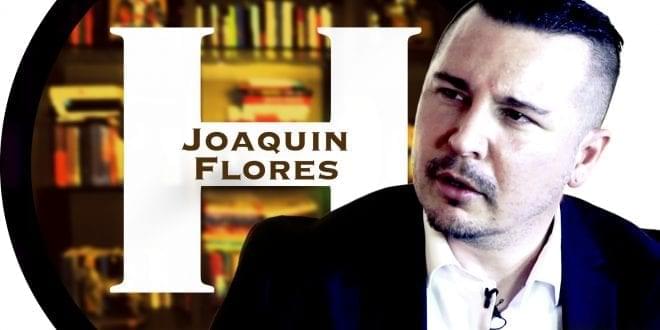Herland Report host, Hanne Nabintu Herland speaks to Joaquin Flores in this interview about the discrimination of Europeans, and the complex dynamics of identity, culture, and self-determination in Europe.
Joaquin Flores, director of the Belgrade-based Center for Syncretic Studies, and Chief Editor at Fort Russ News, argues that Europeans are the indigenous people of Europe and highlights a tension between contemporary European identity and the influx of migrants from developing countries.

The discrimination of indigenous Europeans: He believes that this influx has led to the creation of cultural ghettos rather than integration.
The discussion then pivots to the historical context of identity politics in the U.S., where individuals are often identified by race or ethnicity rather than a nationality defined by shared citizenship.
Flores discusses the media’s role in perpetuating division, noting that a small number of corporations control the narrative, promoting an identity politics framework that many believe could lead to civil unrest. He critiques the contradiction in Western society’s stance, as the right to self-determination is applied selectively.
Ultimately, Flores suggests that both Europe and the United States need to reevaluate their approaches toward cultural integration and identity, advocating for a respectful coexistence that acknowledges and honors different cultures without imposing a singular narrative.
The discrimination of Europeans: Flores points out that Europeans are considered he indigenous people of Europe, highlighting a significant point in the migration discussion. The rise of ghettos is indicative of failed integration efforts, as migrants often seclude themselves instead of assimilating into European societies.
The growth of ghettos indicates that many immigrants prefer to form enclaves rather than assimilate, suggesting a need for policies that foster genuine integration rather than superficial multiculturalism. Flores’ critique implies that effective integration requires not just language and education but also cultural respect and acknowledgment of existing historical identities.
Flores: “What has happened is that in the quest to justify the cultural identity of others, a very strange dance of satiating the guilt of Europeans for the crimes of the Europeans of the past, that no one living in Europe today was a part of, is transmitted and bestowed upon contemporary modern Europeans.”
“And for those reasons, people from the developing world should move to Europe, and they should colonize Europe, and they should basically bring their culture into Europe. Not assimilate. They are encouraged not to become Europeans, but to keep their own culture.”
RELATED ARTICLES:
- Ukraine, Yugoslavia, Syria were all created revolutions – Joaquin Flores
- How to create Revolutions and overthrow governments #Serbia, Libya, Syria – Joaquin Flores
- The current European leaders represent the interests of America, not their own countries, says Dr. Paul Craig Roberts in this Herland Report interview
- The Decline of European Power: Expert Ola Tunander and Hanne Nabintu Herland discuss
- New Era defined by Strong Men with Hard Power, not Soft Power Feminism
- How Totalitarian Socialism Killed Free Speech in Europe – Watch Conservatives Erik Selle and Hanne Nabintu Herland discuss
The discrimination of Europeans: Flores critiques identity politics in the U.S., arguing it fragments national identity by emphasizing racial categories over shared citizenship.
A few corporations control over 90% of American media, influencing public perception and political discourse regarding identity. The European right to self-determination is often deemed a hate crime, which Flores argues creates hypocrisy in discussions of colonialism and nationalism.

The concentration of media ownership can shape narratives in ways that may not reflect the general consensus. This environment fosters divisions as narratives are crafted to suit specific interests, potentially inflaming identity politics further, which Flores suggests could lead to unrest.
Analyzing the influence of the 1960s leftist movements on modern societal norms, Flores discusses how these have affected traditional structures and expectations. A synthesis of cultures rather than divisive identity politics could be the key to future harmony in both Europe and America.
By emphasizing the distinct historical journeys of Europe and the U.S., Flores encourages a nuanced exploration of identity that appreciates the complexity of each country’s colonial history, implications for present societal conflicts, and the paths toward reconciliation.
Flores highlights the psychological impacts of policies and societal changes, such as those stemming from Freud’s theories, suggesting that guilt and societal expectations have shaped identities in ways that may not serve the collective good. This raises important discussions about the emotional and social implications of modern identity politics.
The struggle between embracing multiculturalism while preserving traditional European identities is illustrated by the clashes concerning cultural autonomy. Flores suggests that a balance must be struck, advocating for a pluralistic society that respects diversity without compromising the core identity of nations.
Flores posits that the U.S. could foster a multi-ethnic continental culture, creating a new identity that is distinct from past models of colonization.
By leveraging pop culture and shared experiences, such a transformation could represent a collaborative future, overcoming historical grievances while celebrating diversity.
In conclusion, the discussions in the video raise important considerations about identity politics, self-determination, and the future viability of multiculturalism in both Europe and America, demanding thoughtful engagement with these complexities. NoteGPT.










